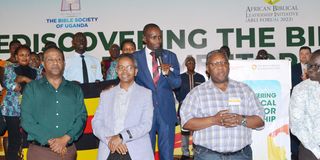Religious leaders share tips on mentorship

Officials who attended the Bible Society summit on mentorship last month. Photos/ Sylvia Katushabe.
What you need to know:
Tips. Mentorship is best practised through actions and documented experiences, writes Sylvia Katushabe
Last month, Bible Society of Uganda hosted the 10th African Bible Leadership Initiative 2022, which attracted church leaders and members from different bible societies across Africa.
The four-day summit held under the theme rediscovering the Biblical Vision of Mentorship, was aimed at equipping, inspiring, and encouraging leaders to ignite personal and cultural transformation in Africa.
Speaking during the event, the former archbishop Church of Uganda Henry Luke Orombi, asked leaders to embrace mentorship programmes to impart their knowledge to the young generation.
“Each one of us grows up and at a certain time in life you will feel weaker than you are today, so if we do not mentor young people who will preach the gospel, grow the church and run church activities?” the retired archbishop asked.
Archbishop Orombi noted that he has mentored many people and he is proud of what most of them have grown to become.
“I would like to see young people come into the church, kept there and prepared for the future. I believe that way we can help them to understand the church and to be responsible,” he said.
Respect and integrity
He noted that as leaders, respect those above you and those below you because they are all people.
He also emphasised sharing, saying the special culture encourages sharing because the first church grew because people shared, even materially because as you give each other you are bonding.
“Sharing discourages begging because somebody is going to put something in your hands,” he said.
Integrity is also among the values mentors ought to emphasise among their mentees.
“As people who are training others, we need to know that you need to treat people with dignity. As an elder I want to encourage my mentees to treat people as humanely regardless of their religion, culture and tribe,” Bishop Orombi said.
Exemplary work ethic
As the adage goes, actions speak louder than words, the archbishop said it is spiritually devastating when a mentee finds out that his mentor is preaching water but taking wine.
Currently, he said, young people do not want to work.
“We need to share our work ethic with our mentees because work ethics have declined. Even then, when you do not work, you cannot get out of poverty,” he said.
Transmit life
The former secretary general World Council of Churches, Rev Samuel Kobia, described mentorship as sharing spiritual lives experience.
The Rev Kobia said a good mentor transmits not just knowledge but holistic ideas that inform how a holistic human should be. He added that mentorship is not information, but equated it to a transmission of life to another person.
“For society to grow, the generation must rely on the experience of the past generation,” he noted.
The Rev Kobia said mentorship started in the Bible with the principle of discipleship in the times of Moses and his father-in-law Jethro. Jethro’s leadership experience helped him to advise Moses on how to instruct the nation of Israel so that he would not be overwhelmed.
The clergyman also referred to the house of mentorship of Timothy, saying it is clear that through the letters that Paul wrote to Timothy, former used his personal experience to sharpen the latter into leadership.
“Timothy was mentored by Paul into church leadership until he became a bishop,” he highlighted.
The Rev Kobia shared tips of mentorship which include:
Delegate and trust
Rev Kobia said delegating is very important so that mentees learn from there and have experience so that they are able to go beyond where they are. Also, a mentor must have trust and confidence in their mentees.
Document experiences
He says it is important to record for posterity because, although traditionally they pass knowledge and ideas from generation to generation by word of mouth, the best is through documentation.
”We must agree that we are not all running our own races, we are not all starting from the same starting point. Instead, we are in the same way standing on the achievements, experience and knowledge of the previous generation,” Rev Kobia said.
Writing of passage
He said writing is very important because it is through the written word that we are able to learn what was there in the past and that it is part of mentorship.
“Writing of passages is part of mentorship, it shows that we will continue with the collective that is written and sharing experience.” Rev Kobia said.
He adds that mentors must have a close relationship with their mentees and deeply care for them and their wellbeing.
A mentor must constantly go through introspection, seek God’s grace all the time so that they do not lead one of the little ones astray.
Notes...
The Rev Samuel Kobia, says for one to be a mentor, one must be willing to lift up their mentees to higher places and more so willing to share much with them.
“Like Jesus who lived only three years with his disciples, sharing not just words but his lifestyle and showing them not just what he knew but who he was,” he explained.




